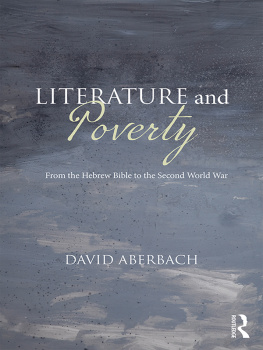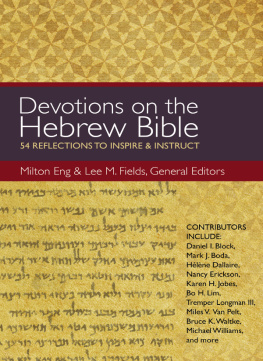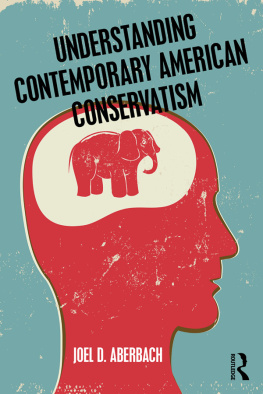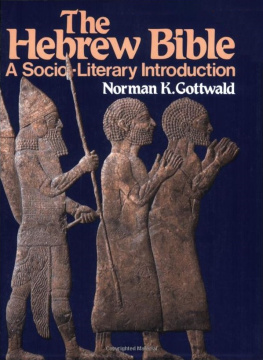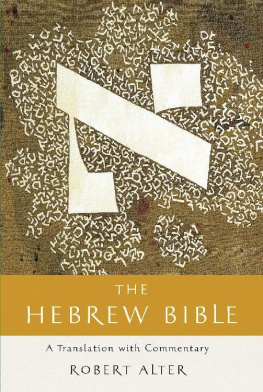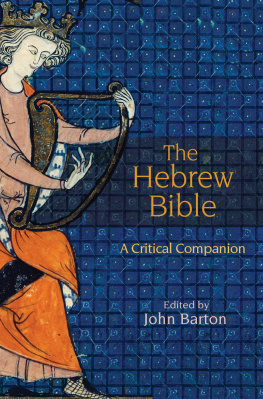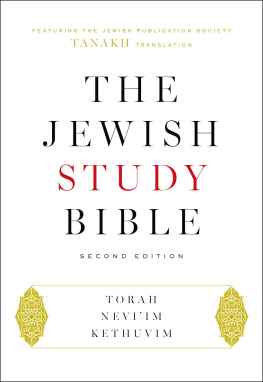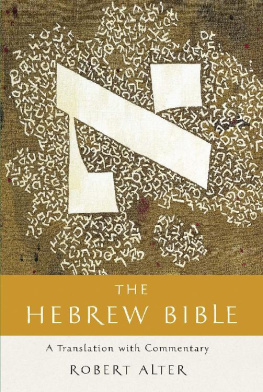David Aberbach - Literature and Poverty: From the Hebrew Bible to the Second World War
Here you can read online David Aberbach - Literature and Poverty: From the Hebrew Bible to the Second World War full text of the book (entire story) in english for free. Download pdf and epub, get meaning, cover and reviews about this ebook. year: 2019, publisher: Routledge, genre: Religion. Description of the work, (preface) as well as reviews are available. Best literature library LitArk.com created for fans of good reading and offers a wide selection of genres:
Romance novel
Science fiction
Adventure
Detective
Science
History
Home and family
Prose
Art
Politics
Computer
Non-fiction
Religion
Business
Children
Humor
Choose a favorite category and find really read worthwhile books. Enjoy immersion in the world of imagination, feel the emotions of the characters or learn something new for yourself, make an fascinating discovery.
- Book:Literature and Poverty: From the Hebrew Bible to the Second World War
- Author:
- Publisher:Routledge
- Genre:
- Year:2019
- Rating:5 / 5
- Favourites:Add to favourites
- Your mark:
- 100
- 1
- 2
- 3
- 4
- 5
Literature and Poverty: From the Hebrew Bible to the Second World War: summary, description and annotation
We offer to read an annotation, description, summary or preface (depends on what the author of the book "Literature and Poverty: From the Hebrew Bible to the Second World War" wrote himself). If you haven't found the necessary information about the book — write in the comments, we will try to find it.
Literature and Poverty: From the Hebrew Bible to the Second World War — read online for free the complete book (whole text) full work
Below is the text of the book, divided by pages. System saving the place of the last page read, allows you to conveniently read the book "Literature and Poverty: From the Hebrew Bible to the Second World War" online for free, without having to search again every time where you left off. Put a bookmark, and you can go to the page where you finished reading at any time.
Font size:
Interval:
Bookmark:

Literature and Poverty offers an engaging overview of changes in literary perceptions of poverty and the poor. Part I of the book, from the Hebrew Bible to the French Revolution, provides essential background information. It introduces the Scriptural ideal of the holy poor and the process by which biblical love of the poor came to be contested and undermined in European legislation and public opinion as capitalism grew and the state took over from the Church; Part II, from the French Revolution to World War II, shows how post-1789 problems of industrialization, population growth, war, and urbanization came to dominate much European literature, as poverty and the poor became central concerns of major writers such as Dickens, Dostoyevsky, and Hugo.
David Aberbach uses literature from the Bible, through Shakespeare, Wordsworth, Zola, Pushkin, and Orwell to show how poverty changed from being an endemic and unavoidable fact of life, to a challenge for equality that might be attainable through a moral and rational society. As a literary and social history of poverty, this book argues for the vital importance of literature and the arts in understanding current problems in International Development.
David Aberbach is Professor of Hebrew and Comparative Studies at McGill University, Canada, and has held visiting positions at Harvard (Kennedy Center for International Development) and the London School of Economics (International Development).
First published 2019
by Routledge
2 Park Square, Milton Park, Abingdon, Oxon OX14 4RN
and by Routledge
52 Vanderbilt Avenue, New York, NY 10017
Routledge is an imprint of the Taylor & Francis Group, an informa business
2019 David Aberbach
The right of David Aberbach to be identified as author of this work has been asserted by him in accordance with sections 77 and 78 of the Copyright, Designs and Patents Act 1988.
All rights reserved. No part of this book may be reprinted or reproduced or utilised in any form or by any electronic, mechanical, or other means, now known or hereafter invented, including photocopying and recording, or in any information storage or retrieval system, without permission in writing from the publishers.
Trademark notice: Product or corporate names may be trademarks or registered trademarks, and are used only for identification and explanation without intent to infringe.
British Library Cataloguing in Publication Data
A catalogue record for this book is available from the British Library
Library of Congress Cataloging-in-Publication Data
Names: Aberbach, David, 1953- author.
Title: Literature and poverty : from the Hebrew Bible to the Second World War / David Aberbach.
Description: London ; New York, NY : Routledge, 2019. | Includes bibliographical references and index.
Identifiers: LCCN 2018042228| ISBN 9780367112486 (hardback : alk. paper) | ISBN 9780367132736 (pbk. : alk. paper)
Subjects: LCSH: Poverty in literature. | Poor in literature. | Poverty--Biblical teaching.
Classification: LCC PN56.P56 A24 2019 | DDC 809/.933556--dc23
LC record available at https://lccn.loc.gov/2018042228
ISBN: 978-0-367-11248-6 (hbk)
ISBN: 978-0-367-13273-6 (pbk)
ISBN: 978-0-429-02559-4 (ebk)
In memory of my mother, Rose Firsht (19172009)
I do not believe that any of us, declared John F. Kennedy in his inaugural address as President of the United States in 1961, would exchange places with any other people or any other generation. I grew up in Baltimore, Maryland in the 1960s, a time and place of rare prosperity and freedom from extreme poverty; yet I experienced America in a European cocoon, as a port shadowed with human misery past, into which the flotsam and jetsam of a shattered Europe had flowed, to be remade as part of America, buoyant, optimistic, and fabulously successful. Daily, I encountered men and woman who in previous lives knew the universal extremes of poverty: hunger, cold, disease, homelessness, high mortality, in European societies whose normal functioning had totally broken down amid economic collapse and war. There were still elderly men and women who had come in steerage and passed through Ellis Island prior to 1914, mostly from Tsarist Russia; they remembered high levels of hunger and unemployment in Europe and in their early years in America, particularly during the Depression of the 1930s. From my Viennese grandmother I heard of the astronomical inflation in the early 1920s, when her savings, slowly earned over many years, could not even buy a loaf of bread. There were penniless refugees from Nazism, hunted like animals, or prisoners of war; and there were also Sephardic Jews who lost everything when escaping persecution in Arab lands. American Jewry in the 1960s, unlike any other society in history, seemed to reach into the past like a Grand Canyon, with layer after open layer of poverty and suffering, with a small, anomalous, not always convincing topsoil of peace, freedom, and prosperity. The American Jewish writers of that period Bernard Malamud, Arthur Miller, Bashevis Singer, Saul Bellow had their roots among the European poor and shared the belief of many of the writers in this book that poverty is a disgrace and should be fought.
My father, Viennese-born and British by nationality, was a Roman Jewish historian by training but, as curator of the Jewish Historical Society of Maryland, helped to record and preserve the history of the Baltimore Jewish community. Many Holocaust survivors had come to Baltimore, as to other cities of refuge, with a special knowledge of extreme poverty: as a calculated station of dehumanization toward mass murder, and a level of suffering amid evil which in the 1960s they were not yet encouraged to talk about publicly. In synagogue on the Ninth of Av, the poetry of starvation in the book of Lamentations spoke to the survivors across a span of 3,000 years:
They beg for bread but no one gives.
Those who once fed on fine food
lie stunned in the streets
skin shrunk on their bones, dry as wood
Those killed by the sword were luckier
than the ones who starved
(1: 11; 4: 5, 9)
This book has had a long apprenticeship in history and literature alike. To my father I am indebted for the approach to poverty in an historical perspective. To my teachers in London and Oxford, above all Frank Kermode and Richard Ellmann, I am thankful for kindling some of the literary interests which entered this book. The range of this book broadened over the years through a course on poverty and literature which I taught at McGill University, Montreal, from 2003 to 2019; and by a series of talks I gave as a visiting fellow at Harvard University and the London School of Economics in 201218. I am grateful to a number of people who over the years in various ways helped move a difficult book forward: Tim Allen, Ken Shadlen, John A. Hall, Ricardo Hausmann, Ian Malcolm, and especially Steven Bloomfield who, as Director of the Weatherhead Center for International Affairs at Harvard, invited me to give a series of talks on Poverty and Ideological Failure, which became the nucleus of this book. This book follows earlier books of mine, on loss and separation, imperialism, charisma, and nationalism, in arguing for greater integration of the Arts and Social Sciences: the understanding of poverty, too, is enriched through the combination of disciplines, and literature has levels of insight and compassion which scientific studies often lack.
Parts of the book were published in changed form in
Font size:
Interval:
Bookmark:
Similar books «Literature and Poverty: From the Hebrew Bible to the Second World War»
Look at similar books to Literature and Poverty: From the Hebrew Bible to the Second World War. We have selected literature similar in name and meaning in the hope of providing readers with more options to find new, interesting, not yet read works.
Discussion, reviews of the book Literature and Poverty: From the Hebrew Bible to the Second World War and just readers' own opinions. Leave your comments, write what you think about the work, its meaning or the main characters. Specify what exactly you liked and what you didn't like, and why you think so.

